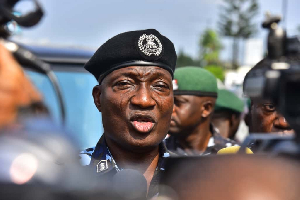Opinions of Thursday, 18 March 2021
Columnist: Nationonlineng.net
Putting Nigeria together again will be hard
CAN Nigeria ever be put together again? This is the question that concentrated my mind as I watched the tragi-comedy of the Deputy Speaker of the House of Representatives, Idris Wase, shutting down a petition by some Nigerians in the Diaspora during plenary last Thursday. I must admit that there are die-hard optimists and it is good to be sanguine. In any case, given the circumstance we have found ourselves, if you remove hope, what else is left? Optimism oils the wheels of everyday living in Nigeria.
As I noted in my New Year article, “2021: Beyond hope”, it helps when a people are having a rough patch, as Nigerians are right now, to look on the sunny side of life. That is where hope, which simply means being able to see that there is light despite all of the darkness around us, comes in.
But utterances of some political leaders push majority of Nigerians into the dark hole of despair. No matter how hard one tries to be buoyant in spirit, the truth is, whatever side of the political spectrum you decide to pitch your tent right now, it is tough to be happy about the current state of the union where uppity and sense of entitlement have stymied national unity. Every issue is viewed from the primordial prism of ethnicity. The consequence is that each day the chasms of division become gorges of prejudice and tragically, we all watch as the country spirals into hate-filled rhetoric.
Anyone who dares complain is accused by those who claim to love Nigeria more than others of being a hater. Yet, Nigeria has never been more divided than it is today. Political leaders have become angrier and more intolerant as political skins become thinner.
That was exactly what played out on the floor of the House on March 11, when a lawmaker, Mark Gbillah, representing Gwer East-Gwer West federal constituency of Benue State, attempted to submit a petition on insecurity in Benue, Nasarawa and Taraba filed by a group of Tiv indigenes living in the United States under the umbrella of Mzough U Tiv Amerika, MUTA.
The Deputy Speaker, who presided, shot down the petition even before it was presented on the laughable ground that Nigerians in the Diaspora have no right petitioning on issues happening in Nigeria. In his desperation, Wase threw parliamentary caution to the winds asserting, without the backing of the 1999 Constitution, that Nigerians who sit in their comfort zones abroad are not eligible to file petitions against the Federal Government on issues pertaining to insecurity.
That was scandalous. Gbillah had hardly finished explaining what the petition was all about when Wase brusquely cut him short, asking rather condescendingly: “Honourable Gbillah, did you say Tivs in America? What do they know about Nigeria? What is their business? They can’t sit in their comfort zones and know what is happening in Nigeria.” Then he self-importantly thundered: “I am not convinced that we have to take that petition”, and ordered a fellow lawmaker who represents his constituents to sit down. It was surreal.
How can a lawmaker say that Nigerians automatically lose their citizenship when they decide to live abroad? When the man who made this claim is the Deputy Speaker of the House of Representatives, it becomes even more tragic. But make no mistake about this. Wase knew what he was saying. Implied in his submission is the subtle use of prejudice tropes in protection of ethnic privilege. Expectedly, Nigerians – home and abroad – are outraged. A former chairman, National Human Rights Commission, Prof. Chidi Odinkalu, captured the mood of the majority when he tweeted: “So, the House of Representatives can so blithely strip Nigerians outside the borders of the country of their citizenship and rights?” Odinkalu wondered whether it was “ignorance or bias or biased ignorance that drives this presiding officer in this piece of inspired parliamentary silliness”, and concluded thus: “The same ninnies who pull this kind of nonsense habitually will show up tomorrow and tell you how Nigeria’s unity is not negotiable when they themselves have made it a tradeable commodity.” Nigerians in the Diaspora Organisation, NIDO, has also protested. In a petition to Speaker Femi Gbajabiamila, signed by Dr. Bashir Obasekola for Nigerians in Diaspora, Europe; Obed Monago for Nigerians in Diaspora, Americas; Prof. E. C. Ejiogu for Nigerians in Diaspora, Asia; Gary Linus Unamadu for Nigerians in Diaspora, Oceania; and Dr. Obinna Kingsman for Nigerians in Diaspora, Africa; the group demanded that Wase should fully retract his statement and offer unconditional public apology to the diasporans.
They also insisted that Gbillah be allowed to re-present the petition. If this is not done within 14 days, they threatened further actions, which might include but not limited to calling out Nigerians in the Diaspora to withhold further home remittances with immediate effect. Of course, they cannot do that because nobody living abroad will stop sending money to his aged parents at home, for instance, because of the indiscretions of the Deputy Speaker of the House of Representatives. But Wase’s injudiciousness has exposed how wide the national fault lines of ethnicity and religion have become because of the deliberate policies, particularly the Fulani supremacist agenda of the Muhammadu Buhari presidency.
Those who think that Wase just misspoke don’t get it. And it was not a question of ignorance of the law, either. He knew what he did. His body language in the video that went viral said it all. He was visibly angry at the audacity of the petitioners. To appreciate what happened, we have to put certain things in context. Wase, who represents Wase Federal Constituency, Plateau State, is a Fulani and a member of the ruling All Progressives Congress, APC.
Gbillah, a member of the opposition Peoples Democratic Party, PDP, as well as the petitioners are Tiv. Those who have been chased out of their ancestral homes in Benue, Taraba and Nasarawa and living in poorly serviced IDP camps are Tiv. Those who attacked, maimed, killed and chased them away from their ancestral homes are Fulani. Simply put, Wase is using his office which is paid for with tax payers’ money to protect ethnic privilege.
While those who own the ancestral lands, most of them farmers, are languishing in IDP camps, bandits, most, if not all, of them Fulani have taken over their property and the government is looking the other way. In order to be politically correct in the Buhari era, we often twist ourselves into “see no evil, hear no evil, speak no evil” pretzels to be called patriots and nationalists. If that petition was written by the Fulani in the Diaspora, Wase wouldn’t have shot it down. He wouldn’t have bothered to know if the group was registered with the Corporate Affairs Commission, CAC.
Political and ethnic colouration
Gbilla’s opening remarks that: “I have a petition from the Mutual Union of the Tiv in America against the Federal Government of Nigeria and the issue has to do with the ancestral land of the Tiv people that seems to have been possessed in recent times through various attacks and the fact that they are languishing in IDP camps till date without any intervention”, was what made Wase fly off the handle. Of course, seeing the backlash, he has tried to walk back his comments, albeit unsuccessfully. He claims that the trending video, showing him preventing Gbillah from laying the petition, had been “doctored, slanted and bent to give political and ethnic colouration to an event that was otherwise strictly based on parliamentary procedures”. That is not true.
When government officials claim that Nigeria is safe, they duplicitously fail to acknowledge that many Nigerians living in IDP camps have nowhere else to go because what used to be their ancestral homes have been taken over by bandits. They have become refugees in their own country. The Nigerian State under Buhari’s watch knows that and is doing nothing about it. Instead, they are preaching peace and forgiveness.
Despite the pockets of agitations for secession, majority of Nigerians would love to live together in a united country. But that country must be one where equity, justice and equal rights trump bigotry, nepotism and ethnic supremacy. Peace will always be a mirage in a milieu where justice is an anathema. Buhari has used six years of his presidency to bring out the animal in us. There is every reason to believe that it will get worse in the remaining two years. Putting Nigeria together again after the Buhari presidency will be the challenge of the millennium.














